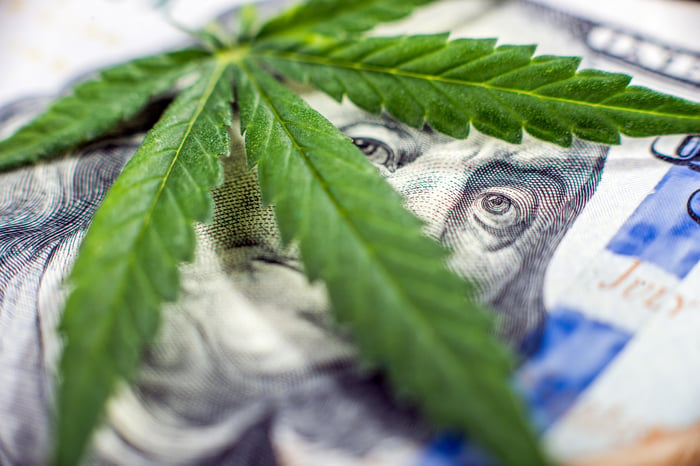Last year was pivotal for the marijuana industry. After decades as a taboo topic that merited only speculative investment, the industry transformed before our eyes into a legitimate business model. The legalization of recreational cannabis in Canada, along with 33 U.S. states having now given the green light to weed in some capacity, has made the industry highly desired by Wall Street and investors.
The previous year was also filled with partnership announcements. The cannabis space witnessed a number of deals during and following the summer, including multiple partnerships that'll likely lead to nonalcoholic cannabis-infused beverages hitting Canadian dispensary shelves by hopefully no later than this coming October. But arguably no company has benefited more from dealmaking of late than grower Cronos Group (CRON 1.84%).

Image source: Getty Images.
Big Tobacco nabs a smoking-hot deal in the cannabis space
Cronos, which became the first marijuana stock to uplist from the over-the-counter exchange to a major U.S. exchange, made waves in early December when it announced that tobacco giant Altria (MO 0.05%) would be taking a $1.8 billion equity stake in the company. Altria now has a 45% stake in Cronos Group, with the ability to exercise warrants it also received to boost its stake up to 55%. Should those warrants be exercised, Cronos would receive an additional $1.05 billion from Altria.
The move makes perfect sense for Altria, which has seen its cigarette shipping volumes decline at a precipitous pace in the United States. According to data from the Centers for Disease Control and Prevention, the ongoing war against tobacco is working, with only 14% of adults now smoking tobacco cigarettes, down from 42% in the mid-1960s. Without new sources of top-line growth, Altria would be forced to continue buying back its stock and raising the price of its tobacco products to grow its top- and bottom-line.
The expectation on Wall Street is that we'll see Cronos Group, which has four new board members nominated by Altria, work with its new partner to create innovative new cannabis consumables. This might include vape products that contain only tetrahydrocannabinol (THC) or cannabidiol (CBD), or perhaps a hybrid of the two. For reference, THC is the cannabinoid responsible for getting a user high, while CBD is the cannabinoid best known for its perceived medical benefits.
There's also the potential that Altria may just scoop up what it doesn't own of Cronos and buy the company outright. That's why shares of Cronos have more than doubled in value since the equity investment was announced.
But the big question is, now that Cronos Group has its cash war chest, what now?
Check out the latest earnings call transcript for Cronos Group.

Image source: Getty Images.
With $1.8 billion in cash on hand, here's what Cronos should do next to impress Wall Street
Assuming Altria doesn't acquire Cronos Group, or at least doesn't choose to do so anytime soon, the focus will be on how the company utilizes its now more than $1.8 billion in cash and cash equivalents on hand. With yours truly finding the company to be grossly overvalued based on its current prospects, here are some "suggestions" for what Cronos should focus on next in order to impress Wall Street, investors, and its largest shareholder, Altria.
The first thing it should do is find a way to dramatically enhance its production capacity. Right now, the company's joint venture (Cronos GrowCo), Peace Naturals, Original BC, Cronos Israel, and Cronos Australia, might yield close to 120,000 kilos in peak annual output. That'd only be good enough for the seventh-highest yield in Canada, despite one of the largest market caps in the industry. Most notably, investors can currently purchase growers with similar peak output for less than a quarter of Cronos' market cap.
For Cronos to be able to hold its weight, it's going to need additional production capacity. Whether the company adds this capacity via acquisition or through organic means isn't as important as management realizing that it doesn't have the output to really compete at 120,000 kilos.

Image source: Getty Images.
Second, it's time for Cronos Group to get serious about expanding into international markets. As noted, the company has cultivation farms licensed and located in Australia and Israel, as well as distribution channels in Poland and Germany. But that's some pretty anemic overseas representation when more than 40 countries worldwide have given the green light to medical marijuana. The company will need to hedge its bets on domestic oversupply by finding new international sales channels in the months that lie ahead, and should be willing to pay up to lay the groundwork for its overseas infrastructure.
Third and finally, Cronos will need to continue to diversify its product portfolio away from lower margin dried cannabis flower. The company's $100 million partnership with Ginkgo Bioworks, which allows Cronos access to Ginkgo's microorganism platform for the development of yeast strains capable of commercial cannabinoid production, is a perfect example of a high-margin venture Wall Street will cheer. Cronos needs to find at least one more alternative product it can push, other than dried cannabis, if it has any chance of maintaining its lofty valuation.
What's next for Cronos Group is anyone's guess, but yours truly is expecting a targeted spending spree to commence any day now.





